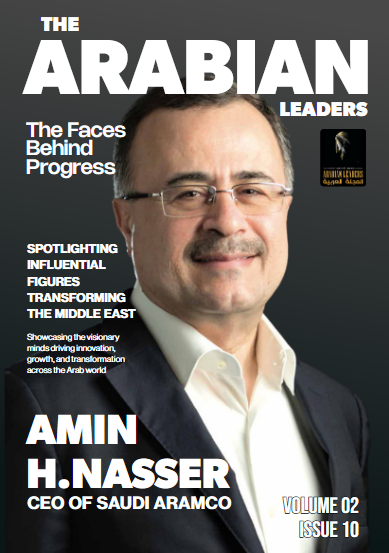There are individuals whose names emerge not through noise but through consistency, discipline, and silent achievements. Among them stands Nadir Sami Al-Koraya, a name perhaps not often quoted in press conferences or splashed across headlines, but one that holds remarkable weight within the financial arteries of Saudi Arabia. His journey has not been one of flamboyant ascent, but of calculated progression. His demeanor is not one that seeks attention, but one that commands respect. In the world of Saudi banking, Al-Koraya is a man of systems, structure, and substance.
Appointed CEO of Riyad Bank in 2024, Al-Koraya assumed leadership at a delicate yet defining moment in Saudi Arabia’s economic history. The country, under the sweeping directives of Vision 2030, was entering a phase that demanded more than growth. It demanded transformation. In a time when the financial sector was expected not only to support but to accelerate national change, Al-Koraya stood as the man selected to turn a traditional banking institution into a futuristic engine of progress.
But to understand Nadir Sami Al-Koraya is not merely to observe his current title. It is to walk backwards, tracing the arc of a career that has moved through Saudi Arabia’s modern economic corridors with deliberate intent. Al-Koraya is not a product of fortune; he is a product of refinement. He did not arrive at Riyad Bank by accident, but by strategy. And that strategy—one shaped by decades of experience in the Kingdom’s most critical financial spaces—is now being used to reconfigure one of Saudi Arabia’s most important banks into a pillar of the future.
FOUNDATIONS BUILT IN QUIET
Before Riyad Bank, before the signature at the bottom of executive statements, and before the boardrooms lined with vision charts and strategic roadmaps, there was a young man studying numbers, observing systems, and absorbing the structural rhythms of Saudi finance. In a world increasingly consumed by rapid change and loud leadership, Al-Koraya represents the rare breed that believes in internal excellence before external recognition.
Much of his professional life prior to Riyad Bank was spent in Samba Financial Group—an institution that, in its time, stood as a monument to traditional banking excellence in the Kingdom. Within Samba, Al-Koraya held senior positions, many of which were directly responsible for shaping operational policy, improving risk controls, and engineering customer-focused models. His tenure in Samba was not glamorous, but it was foundational. While some chased accolades, Al-Koraya refined frameworks. Where others pursued visibility, he pursued efficiency.
To those who worked with him, Al-Koraya was never the loudest voice in the room. But he was often the one who, when he spoke, silenced the room. It was not a matter of authority—it was the weight of insight. He earned his place not through presentation, but through preparation. And that preparation is what shaped his transition into one of the most critical banking roles in the country.
THE CALL TO RIYAD BANK
In early 2024, as Riyad Bank prepared to reposition itself amid evolving national priorities, the board made a decision that would quietly but powerfully shift its trajectory. It appointed Nadir Sami Al-Koraya as its new Chief Executive Officer. The decision did not come with fanfare. There were no dramatic unveilings, no sweeping press announcements. But within financial circles, the decision was recognized for what it was: a strategic masterstroke.
At the time, Riyad Bank was already a respected institution. It held weight in the Kingdom, had a respectable portfolio, and maintained a disciplined financial approach. But it lacked one thing—transformational leadership with roots deep enough to honor the institution’s legacy and vision wide enough to prepare it for the future. In Al-Koraya, the bank found both.
From the moment he assumed office, it became clear that Riyad Bank’s operations would no longer be defined solely by profit margins or product offerings. Under Al-Koraya, the institution would now be defined by alignment. Alignment with Vision 2030. Alignment with digital transformation. Alignment with global banking standards. And, perhaps most importantly, alignment with Saudi Arabia’s ambition to not merely participate in global finance, but to influence it.
STRUCTURE AS STRATEGY
Al-Koraya’s leadership is not centered around charisma; it is centered around coherence. One of the first major internal shifts he oversaw was a complete reorganization of Riyad Bank’s digital strategy. He was not interested in cosmetic innovation—mobile apps or token automation. He sought to rebuild the bank’s technological DNA. With a methodical approach, he brought in specialists, commissioned reviews, and approved investment in internal systems that would create agility rather than just convenience.
At the same time, Al-Koraya turned his attention to risk governance. For him, the strength of a bank is not in the size of its assets, but in the resilience of its protocols. He redesigned the bank’s compliance structure, improved internal audit flows, and implemented training regimens designed to move compliance from a regulatory checkbox to a cultural expectation.
But perhaps his most defining impact has been in the cultural reshaping of the bank’s leadership. Al-Koraya does not believe in executive silos. He built cross-functional teams, encouraged interdepartmental dialogues, and instituted KPIs that extended beyond profitability into impact. He made it clear: Riyad Bank would no longer be managed—it would be led. And that leadership would come not from one office, but from every desk.
ALIGNING WITH THE KINGDOM
It would be incorrect to suggest that Nadir Sami Al-Koraya is simply running a bank. In reality, he is facilitating a mission. In today’s Saudi Arabia, banking is no longer an isolated industry; it is a lever of national transformation. And Al-Koraya has emerged as one of the few executives who understands this deeply.
His vision for Riyad Bank is directly aligned with the socio-economic shifts demanded by Vision 2030. Whether it is expanding access to finance for SMEs, supporting national housing programs, or facilitating infrastructure projects, Al-Koraya has ensured that the bank’s lending priorities mirror the country’s development roadmap. He has also prioritized financial inclusion, launching initiatives aimed at improving financial literacy among youth and underbanked populations.
Beyond internal operations, he has also emerged as a quiet influencer within national financial policymaking. His insights have been sought in advisory roles, and his reports have found their way into strategic discussions at the highest levels. He does not speak often in public forums, but when he does, his words are measured, deliberate, and almost always followed by implementation.
A NEW ERA OF RESPONSIBILITY
In the new Saudi Arabia, corporate responsibility is no longer an optional add-on. It is a core metric of institutional relevance. Al-Koraya recognized this early and has made sustainability and community development pillars of Riyad Bank’s future. Under his leadership, the bank has launched programs supporting environmental initiatives, youth entrepreneurship, and women’s financial empowerment. He believes that a bank must not only manage money but must also multiply opportunity.
Internally, he has also championed a quiet but consistent effort to empower Saudi talent. His hiring policies reflect a commitment to national capacity-building, and his mentorship of young executives has become a known culture within the bank. He does not believe in celebrating potential from afar—he believes in cultivating it from within.
THE UNWRITTEN FUTURE
What lies ahead for Nadir Sami Al-Koraya is not a question of upward mobility. He has reached the summit of one of the Kingdom’s most significant financial institutions. The real question is how he will continue to reshape it—and through it, influence the country’s broader financial future.
His plans for Riyad Bank remain ambitious yet realistic. He seeks expansion, yes—but expansion grounded in purpose. He envisions regional presence—but only if it amplifies domestic value. He speaks of innovation—but only if it preserves institutional integrity. In short, Al-Koraya is not interested in banking trends; he is focused on banking principles.
CONCLUSION
There are those who seek legacy through visibility. And then there are those, like Nadir Sami Al-Koraya, who build legacy through substance. His story is not one of dramatic turns or headline-grabbing announcements. It is a story of deliberate rise, disciplined stewardship, and unshakeable clarity.
In a time when Saudi Arabia is seeking excellence in every sector, Al-Koraya represents the type of leader the Kingdom needs more of—quiet, focused, principled, and unrelentingly strategic. He is not the face of transformation. He is the engine behind it. And as Riyad Bank continues to grow under his leadership, so too does the Kingdom’s promise of a stable, innovative, and inclusive financial future.








